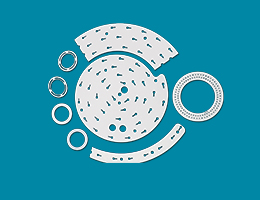
● Introduction
The conventional insulating materials have a lot of shortcomings, for example, low temperature resistance, low purity, poor toughness and corrosion resistance, release gas and uninsulate under high temperatures. However, the PBN plates can solve these problems.
● Characteristic
1. PBN material can resist the high temperature of 2300℃ in a vacuum environment and 2700℃ in ammonia atmosphere.
2. High purity (>99.99%). And it will not release gas impurities when services at high temperature.
3. Good toughness. It is similar to the hexagonal structure of graphite.
4. Good insulation at high temperature. The volume resistivity is 3.11×1011Ω·cm
5. Chemical inertness. Good corrosion resistance of acid, alkali and organic solvent.
6. It can reduce the heat waste by preventing heat conduction.
● Parameter
| property | unit | value | |
| density | g/cm3 | 2.0-2.19 | |
| microhardness (knoop)(ab side) | N/mm2 | 691.88 | |
| resistivity | Ω·cm | 3.11×1011 | |
| tensile strength(N∥C) | N/mm2 | 153.86 | |
| bend strength | (力|| “C”) | N/mm2 | 243.63 |
| (力⊥“C”) | N/mm2 | 197.76 | |
| thermo conductivity | W/m·k | “a” direction “c” direction | |
| (200℃) | W/m·k | 60 2.60 | |
| (900℃) | W/m·k | 43.70 2.80 | |
| dielectric strength(at room temperature) | KV/mm | 56 | |
● Application:
These products can be used as insulation pads, gaskets, stents and other materials, which can be used in the field of vacuum, high temperature and MBE equipment.